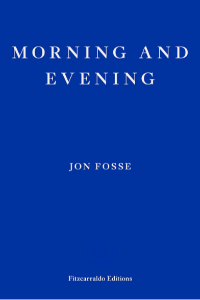The Norwegian author Jon Fosse had just entered middle age when he published Morgon og kveld (2000), a slim novel depicting the first and last days in the life of an ordinary fisherman. Damion Searls’ English translation received scant coverage when it was first published in the US by Dalkey Archive Press in 2015. Back then, Fosse was relatively unknown in the English-speaking world. He has since gone on to international repute after winning the 2023 Nobel Prize in Literature, and the book has now been published in the UK for the first time, courtesy of Fitzcarraldo Editions.
Morning and Evening begins with a 13-page birth scene. A baby boy is born, and the father exultantly declares: “His name will be Johannes . . . And he’ll be a fisherman, like his father.” We then abruptly skip forward a number of decades; Johannes is now an ailing, elderly widower pottering about his shed, dolefully contemplating the laundry tubs and gardening tools that had belonged to has late wife, Erna: “Every one of these things . . . is at the same time heavy with all the work that has ever been done with it and light, so light . . . that’s how it is, the people leave and the things stay.”
Johannes goes out for a walk, feeling curiously weightless and sensing that “everything has changed somehow, the things, the house, they all look different, heavier and lighter somehow, as though there were more of the earth in the houses and more of the sky too.” He meets his oldest friend, Peter, and together they go out to sea in a dory to retrieve a catch of crabs from crab traps; after returning to shore, they find themselves unaccountably clad in their finest suits. Later he runs into his daughter, Signe, but she doesn’t register his presence.

Eventually the penny drops: Johannes died in his sleep that morning, and has been wandering around as a ghost; Peter, himself long dead, is tasked with shepherding his friend’s soul to the afterlife. The reader figures it out before Johannes does, which makes his confusion all the more poignant. “Everything is all wrong today, everything that happens today is happening so immediately and suddenly.”
Fosse’s distinctive prose style — a spare, elegant minimalism deftly complicated by stylised, mesmeric repetitions — conjures a suitably haunting atmosphere, a sense of a once familiar world turned uncannily strange. The phrase “Johannes thinks”, for example, occurs with far greater frequency than is strictly necessary; coffee and cigarettes, the symbolic mainstays of a lifetime’s homely routine, are a recurring, melancholic motif. The almost complete absence of full-stops is no mere gimmick: the narrative, effectively punctuated by a string of lower-case “and”s, has an easy, hallucinatory suppleness that serves the story well.
The result is a work of graceful, spine-tingling beauty. Despite its sad premise, there is something oddly comforting in the novel’s ambience of cosmic inevitability, encapsulated in the resigned, matter-of-fact laconism of the dialogue: the word “Yes” features with conspicuous regularity, as does the phlegmatic refrain, “That’s how it is”, which is uttered by several characters including the midwife who delivers Johannes, and the doctor who certifies his death.
Fosse was an atheist when he wrote Morning and Evening, but later embraced Catholicism in his fifties. We can perhaps discern, with hindsight, a harbinger of that religious awakening in this tale’s quietist overtones and its soothing evocation of a benign hereafter. As Peter gently ushers Johannes towards the other side, he reassures him: “Everything you love is there, everything you don’t love is not there.”
Morning and Evening by Jon Fosse, translated by Damion Searls Fitzcarraldo Editions £9.99, 64 pages
Join our online book group on Facebook at FT Books Café and subscribe to our podcast Life and Art wherever you listen













































































































































































You must be logged in to post a comment Login